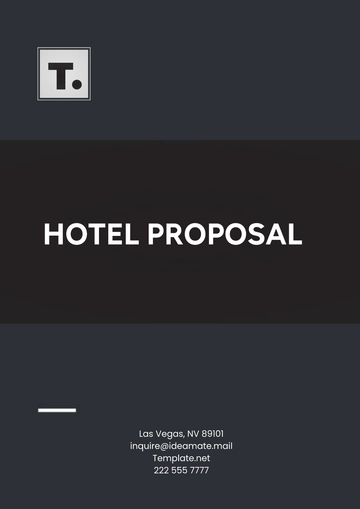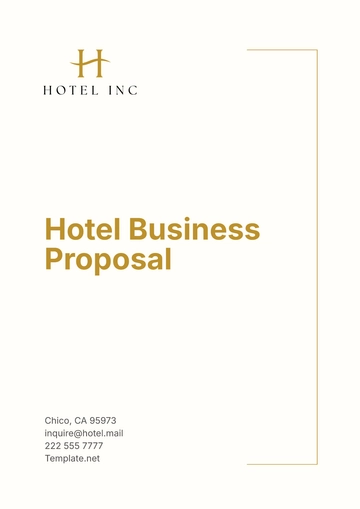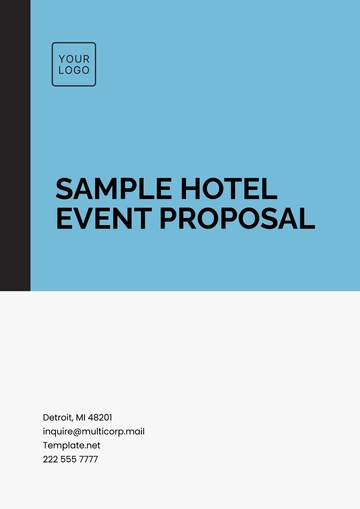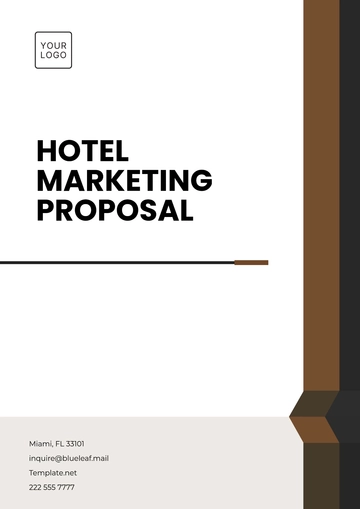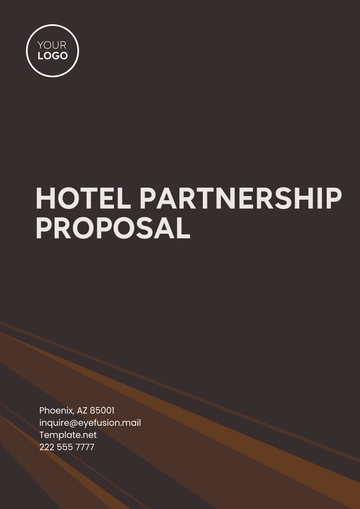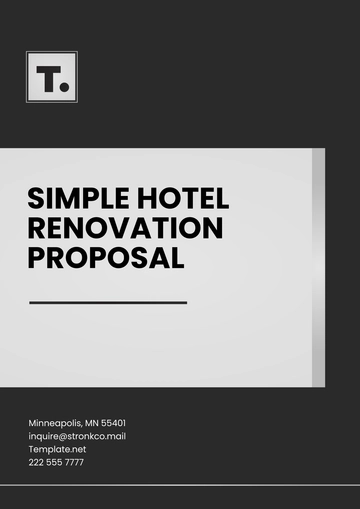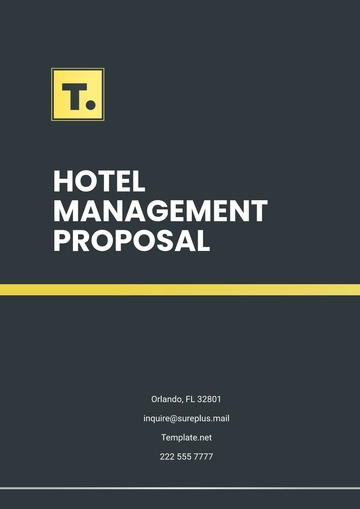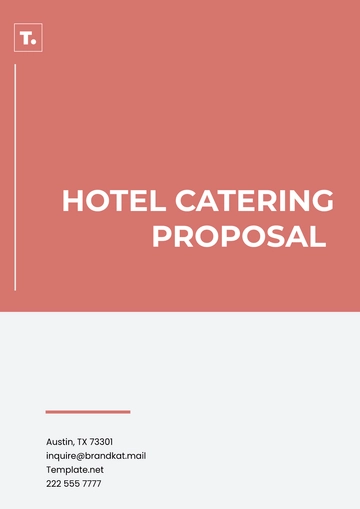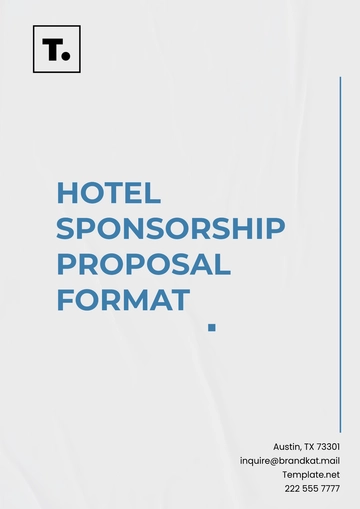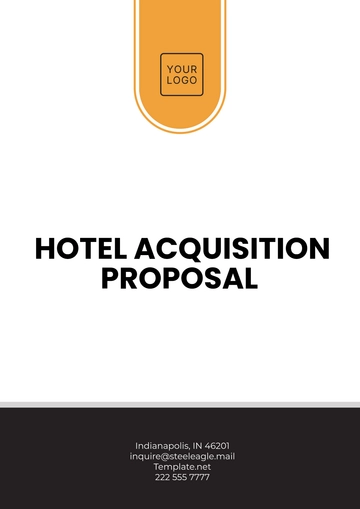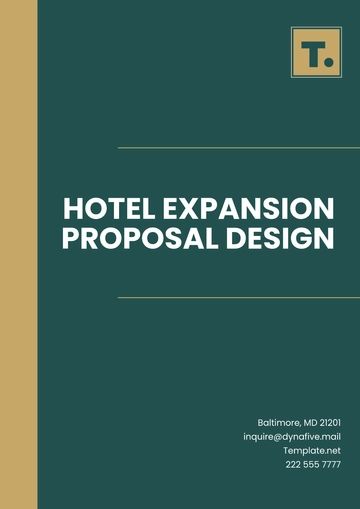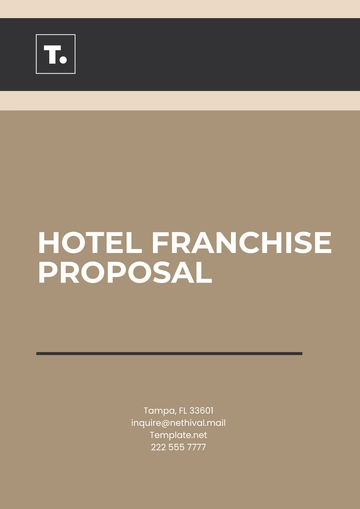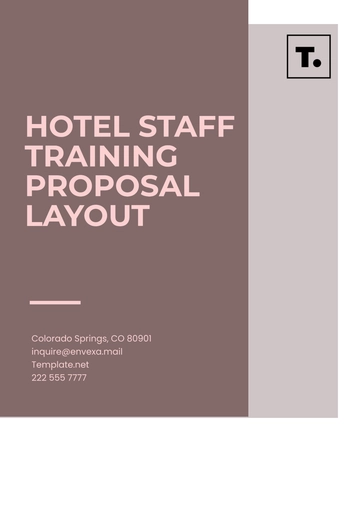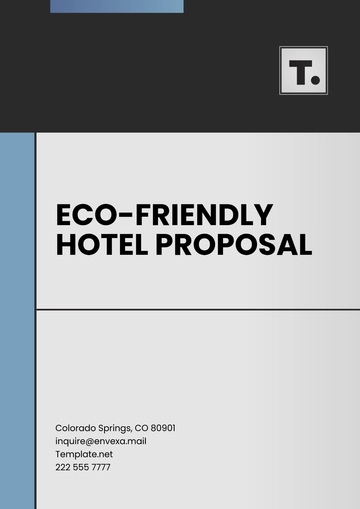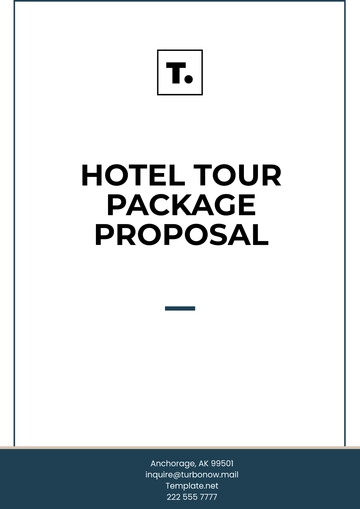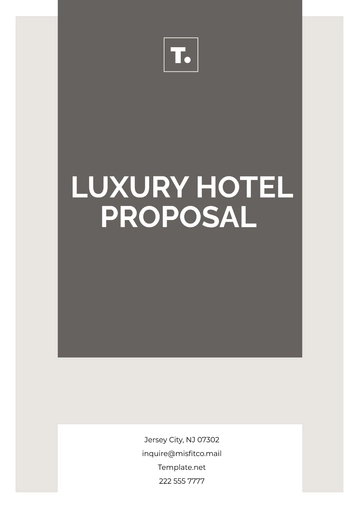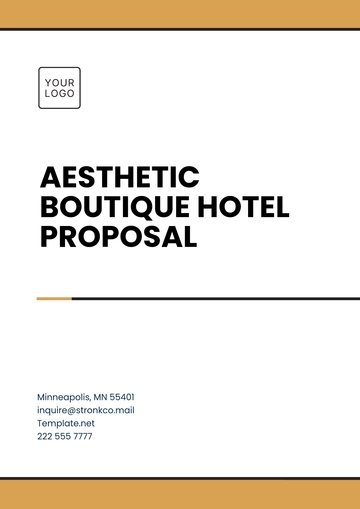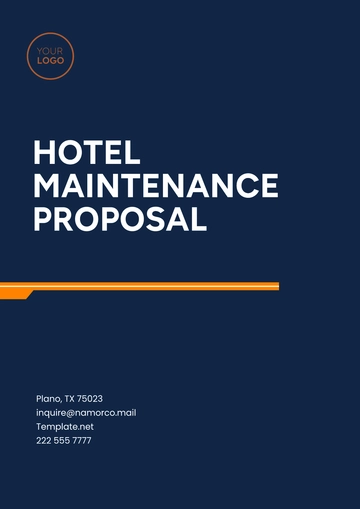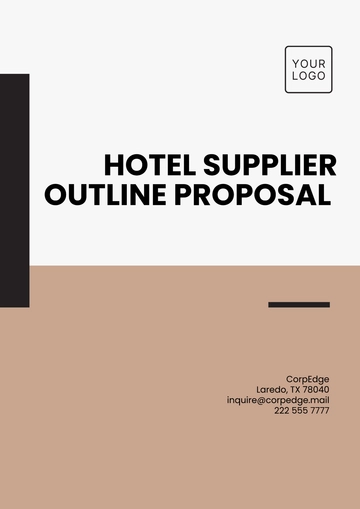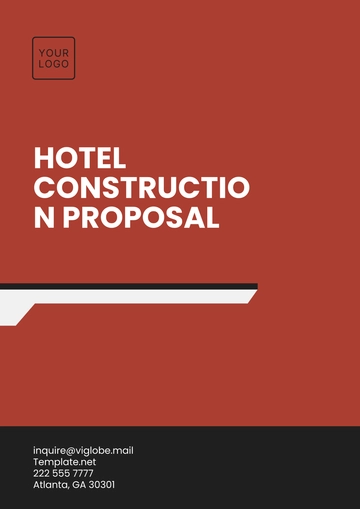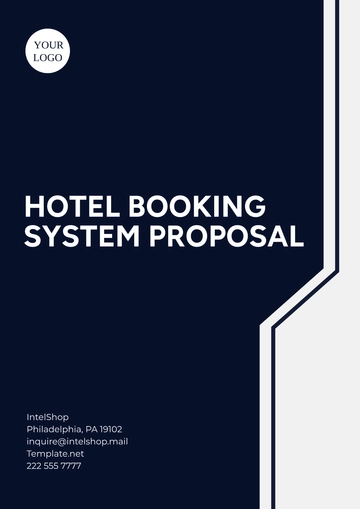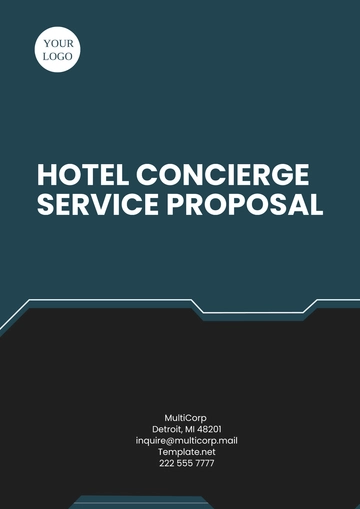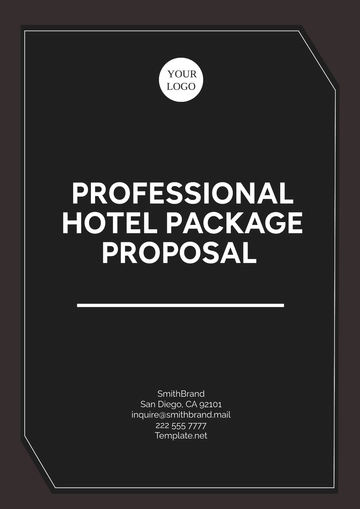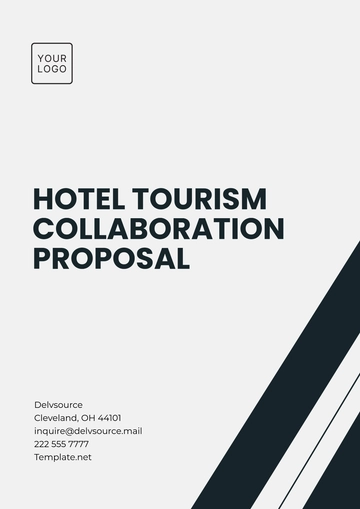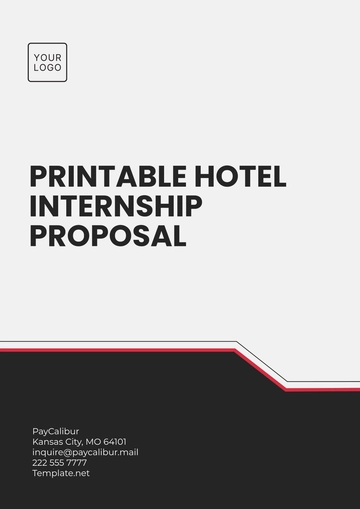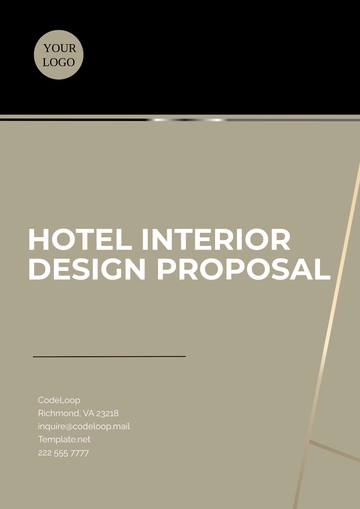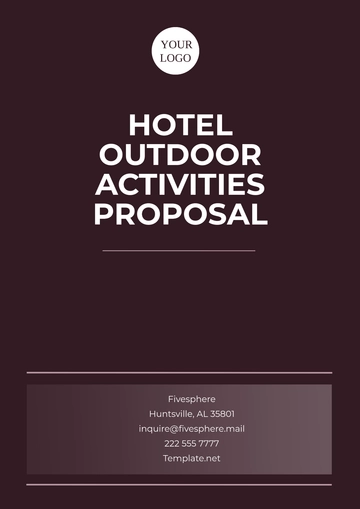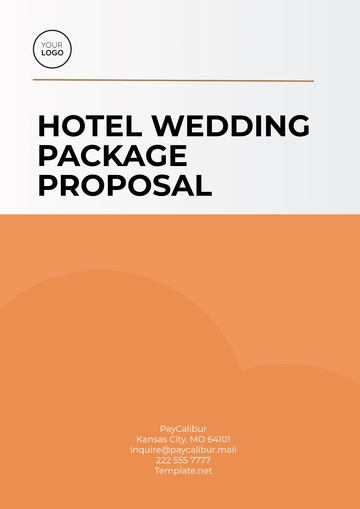Free Hotel Bid Proposal
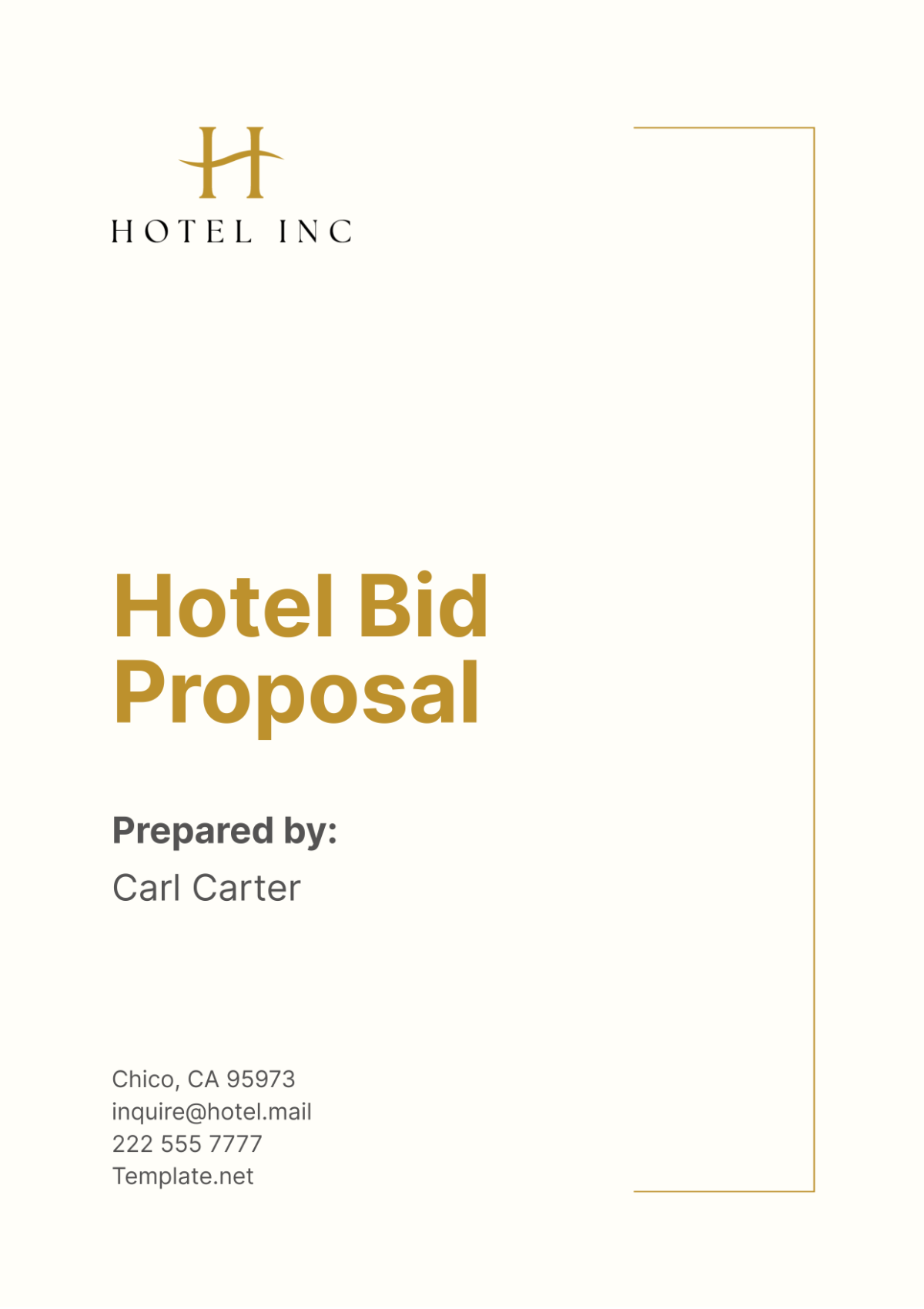
I. Executive Summary
The purpose of this Bid Proposal is to set forth a plan for the construction and operation of a new hotel by [Your Company Name]. This project aims to deliver a top-quality establishment that will provide comfortable, state-of-the-art lodging facilities to its guests. By leveraging our extensive experience and expertise in the hospitality sector, we intend to create a welcoming environment that will attract both business and leisure travelers alike.
A. Scope
Our approach covers all aspects of the project, from initial planning and site selection to construction and final touch-ups. We are committed to delivering a high-caliber service that will meet or exceed all stakeholder expectations. This proposal highlights our methodologies, timelines, financial estimates, and risk management strategies, ensuring a transparent and effective project plan.
II. Project Objectives
In this section, we outline the core objectives of the hotel construction project. [Your Company Name] is dedicated to achieving the following goals to ensure the successful completion and operation of the hotel:
Timely and Cost-effective Completion: Our foremost objective is to complete the hotel construction within the predetermined timeline and budget. We will implement efficient project management strategies, closely monitor progress, and proactively address any potential delays or budgetary concerns to ensure timely delivery without compromising quality.
Compliance with Standards and Regulations: We are committed to ensuring that all facilities meet industry standards and comply with local zoning and safety regulations. Our team will conduct thorough inspections and adhere to building codes and regulations to guarantee the safety, integrity, and legality of the hotel's construction and operation.
Exceptional Guest Experience: Creating a comfortable and inviting atmosphere is paramount to achieving high customer satisfaction and fostering repeat business. We will prioritize the design and construction of guest rooms, amenities, and public spaces to provide a welcoming environment that exceeds guests' expectations and enhances their overall experience.
Sustainability and Environmental Responsibility: Environmental stewardship is integral to our construction and operational philosophy. We will employ sustainable practices throughout the construction process, including energy-efficient design, use of eco-friendly materials, and waste reduction strategies.
By focusing on these objectives, [Your Company Name] is committed to delivering a high-quality hotel that will not only serve as a key asset to our client's portfolio but also as a beacon of excellence in hospitality, contributing significantly to the local economy and community development.
III. Scope of Work
This section provides a comprehensive overview of the specific tasks and phases involved in the hotel construction project. The project scope encompasses a range of activities designed to ensure the successful planning, execution, and operation of the hotel. Key components include:
Initial Planning and Site Selection: The project will commence with meticulous planning and site selection to identify the most suitable location for the hotel. This phase involves thorough analysis of local market dynamics, zoning regulations, and site feasibility studies to determine the optimal site for construction.
Architectural Design and Engineering: Once the site is selected, our team of experienced architects and engineers will collaborate to develop a cutting-edge architectural design that combines functionality, aesthetics, and sustainability. Detailed engineering plans will be created to ensure structural integrity and compliance with building codes and regulations.
Construction and Quality Assurance: With the architectural and engineering plans finalized, construction will commence under the supervision of seasoned project managers and construction professionals. Our team will prioritize quality assurance at every stage of the construction process, conducting regular inspections and adhering to strict quality standards to deliver a superior end product.
Interior Design and Furnishings: Simultaneously, our interior design team will work to create captivating interior spaces that reflect the hotel's brand identity and cater to the needs and preferences of guests. From luxurious guest rooms to elegant public areas, every aspect of the interior design will be carefully curated to enhance the guest experience and elevate the hotel's ambiance.
Staff Training and Operational Setup: As construction nears completion, focus will shift to staff training and operational setup to ensure a seamless transition to hotel operations. Our experienced hospitality professionals will conduct comprehensive training programs to equip staff with the necessary skills and knowledge to deliver exceptional service and uphold the hotel's standards of excellence.
Each phase of the project will be planned and executed by seasoned professionals from [Your Company Name], leveraging their expertise and industry insights to deliver outstanding results. Quarterly progress reports will be provided to keep all stakeholders informed of project milestones, challenges, and achievements, fostering transparency and collaboration throughout the project lifecycle.
IV. Timeline
This section outlines the proposed timeline for the entire project, detailing each phase's duration, start date, and end date:
Phase | Start Date | End Date |
|---|---|---|
Initial Planning and Site Selection | [Month Day, Year] | [Month Day, Year] |
Architectural Design and Engineering | [Month Day, Year] | [Month Day, Year] |
Construction and Quality Assurance | [Month Day, Year] | [Month Day, Year] |
Interior Design and Furnishings | [Month Day, Year] | [Month Day, Year] |
Staff Training and Operational Setup | [Month Day, Year] | [Month Day, Year] |
The total projected timeline for the project is [27 months], with an anticipated completion date of [Month Day, Year].
A. Detailed Phases:
Initial Planning and Site Selection:
Conduct comprehensive site evaluations and feasibility studies to select the optimal location for the hotel.
Engage with local authorities and stakeholders to obtain necessary permits and approvals.
Architectural Design and Engineering
Collaborate with architects and engineers to develop detailed architectural plans and engineering designs.
Ensure compliance with building codes, zoning regulations, and industry standards.
Construction and Quality Assurance
Commence construction activities following approval of architectural and engineering plans.
Implement stringent quality assurance measures to maintain construction standards and meet project milestones.
Interior Design and Furnishings
Create captivating interior spaces that align with the hotel's brand identity and enhance guest comfort.
Procure and install furnishings, fixtures, and equipment to elevate the hotel's ambiance and aesthetic appeal.
Staff Training and Operational Setup
Conduct comprehensive training programs to equip staff with the necessary skills and knowledge for hotel operations.
Finalize operational procedures and systems to ensure a smooth transition to full-scale hotel operations.
By adhering to this proposed timeline and diligently executing each phase of the project, [Your Company Name] is poised to deliver a world-class hotel that exceeds expectations and sets new standards of excellence in the hospitality industry.
V. Financial Estimates
This section provides an overview of the financial aspects of the project, including estimated costs for each phase:
Phase | Estimated Cost |
|---|---|
Initial Planning and Site Selection | $100,000 |
Architectural Design and Engineering | $200,000 |
Construction and Quality Assurance | $2,500,000 |
Interior Design and Furnishings | $500,000 |
Staff Training and Operational Setup | $100,000 |
The total estimated budget for the entire project is [$3,400,000]. This estimate includes a contingency fund to manage unforeseen expenses and ensure the project stays within budget. Detailed financial reports will be generated regularly to monitor and manage the budget effectively.
A. Detailed Breakdown:
Initial Planning and Site Selection: Expenses related to site evaluations, feasibility studies, and permit acquisition.
Architectural Design and Engineering: Costs associated with architectural and engineering services, including design development, structural analysis, and consulting fees.
Construction and Quality Assurance: Comprehensive budget covering construction materials, labor costs, equipment rentals, and quality assurance measures to ensure adherence to project specifications and industry standards.
Interior Design and Furnishings: Budget allocated for interior design concepts, procurement of furnishings, fixtures, and decorative elements to enhance the hotel's aesthetic appeal and guest experience.
Staff Training and Operational Setup: Expenses related to staff training programs, operational setup, and implementation of hospitality management systems to prepare for the hotel's grand opening and ongoing operation.
By managing the budget and diligently monitoring expenses throughout each phase of the project, [Your Company Name] is committed to delivering exceptional value and ensuring the successful completion of the hotel construction project within the allocated budget and timeline.
VI. Risk Management
This section provides an overview of the potential risks associated with the project and outlines the proactive measures we will take to mitigate them:
A. Key Risks
Unexpected Delays: Factors such as adverse weather conditions or disruptions in the supply chain can lead to delays in project timelines, impacting overall progress and potentially resulting in increased costs.
Regulatory Compliance and Zoning Challenges: Complex regulatory requirements and zoning restrictions may pose challenges during the planning and construction phases, leading to delays or modifications in project plans.
Budget Overruns: Unforeseen circumstances, such as fluctuations in material costs or unexpected project scope changes, can result in budget overruns, jeopardizing the financial viability of the project.
Labor Shortages and Training Delays: Shortages in skilled labor or delays in staff training programs can hinder construction progress and operational readiness, affecting project timelines and quality of service delivery.
B. Risk Mitigation Strategies
To mitigate these risks, we have developed a comprehensive risk management strategy that includes the following proactive measures:
Regular Risk Assessments: Our team will conduct ongoing risk assessments throughout the project lifecycle to identify potential threats and vulnerabilities. By staying vigilant and proactive, we can anticipate and address risks before they escalate.
Contingency Planning: We will develop robust contingency plans for each identified risk scenario, outlining predetermined actions and alternative strategies to minimize disruption and mitigate the impact on project timelines and budgets.
Open Communication: Maintaining transparent and open communication channels with all stakeholders is essential for effective risk management. We will foster a collaborative environment where concerns can be raised and addressed promptly, ensuring alignment and cooperation among project team members.
C. Experience and Expertise
With decades of collective experience in the construction and hospitality industries, our team at [Your Company Name] is well-equipped to navigate potential risks and challenges effectively. Our proven track record of successfully delivering complex projects under challenging conditions demonstrates our commitment to excellence and our ability to adapt to changing circumstances.
By implementing a proactive risk management strategy and leveraging our expertise, we are confident in our ability to overcome challenges and ensure the successful completion of the project, delivering exceptional value to our clients and stakeholders.
VII. Sustainability Strategy
[Your Company Name] is committed to sustainability and environmental stewardship in all aspects of the hotel construction project. This section outlines our sustainability strategy and initiatives to minimize the project's environmental footprint and promote social responsibility:
Green Building Practices: We will prioritize the use of eco-friendly materials and sustainable building practices throughout the construction process. This includes sourcing materials from local suppliers to reduce transportation emissions, implementing energy-efficient designs, and incorporating renewable energy sources such as solar panels or geothermal heating systems.
Waste Reduction and Recycling: To minimize waste generation, we will implement waste reduction strategies such as recycling and composting programs. Construction debris will be sorted and recycled whenever possible, and leftover materials will be donated to local organizations or repurposed for future projects
Water Conservation: Efficient water management strategies will be implemented to minimize water consumption during construction and operation. This includes the installation of low-flow plumbing fixtures, rainwater harvesting systems, and drought-resistant landscaping to reduce water usage and promote water conservation.
Community Engagement: We are committed to engaging with the local community to promote sustainability and social responsibility. This includes hosting educational workshops, participating in community clean-up initiatives, and supporting local environmental conservation projects to foster a sense of environmental stewardship and community involvement.
Certification and Recognition: We will pursue green building certifications such as LEED (Leadership in Energy and Environmental Design) or Green Globes to validate our commitment to sustainability and provide assurance to stakeholders. Additionally, we will actively seek recognition from industry organizations and sustainability initiatives to showcase our efforts and inspire others to adopt similar practices.
Long-term Monitoring and Adaptive Management: Our commitment to biodiversity conservation extends beyond the construction phase. We will establish long-term monitoring programs to assess the ecological impact of the hotel and implement adaptive management strategies to address any unforeseen challenges or changes in local biodiversity.
By integrating sustainability into every aspect of the hotel construction project, [Your Company Name] aims to not only minimize environmental impact but also create a healthier, more sustainable future for our guests, employees, and the community at large.
VIII. Conclusion
[Your Company Name] is well-positioned to deliver a successful hotel construction project that meets all specified objectives and standards. Our team's experience, dedication, and comprehensive approach to project management make us the ideal partner for this endeavor. We are excited about the opportunity to work with you and are confident that our proposal provides a robust framework for the successful launch and operation of your new hotel.
- 100% Customizable, free editor
- Access 1 Million+ Templates, photo’s & graphics
- Download or share as a template
- Click and replace photos, graphics, text, backgrounds
- Resize, crop, AI write & more
- Access advanced editor
Win bids with the Hotel Bid Proposal Template, exclusively on Template.net. This versatile template offers comprehensive designs to outline services, costs, and benefits. With seamless editing features in our Ai Editor Tool, create proposals that effectively communicate your hotel's value and capabilities. Download a copy of our template today!
You may also like
- Business Proposal
- Research Proposal
- Proposal Request
- Project Proposal
- Grant Proposal
- Photography Proposal
- Job Proposal
- Budget Proposal
- Marketing Proposal
- Branding Proposal
- Advertising Proposal
- Sales Proposal
- Startup Proposal
- Event Proposal
- Creative Proposal
- Restaurant Proposal
- Blank Proposal
- One Page Proposal
- Proposal Report
- IT Proposal
- Non Profit Proposal
- Training Proposal
- Construction Proposal
- School Proposal
- Cleaning Proposal
- Contract Proposal
- HR Proposal
- Travel Agency Proposal
- Small Business Proposal
- Investment Proposal
- Bid Proposal
- Retail Business Proposal
- Sponsorship Proposal
- Academic Proposal
- Partnership Proposal
- Work Proposal
- Agency Proposal
- University Proposal
- Accounting Proposal
- Real Estate Proposal
- Hotel Proposal
- Product Proposal
- Advertising Agency Proposal
- Development Proposal
- Loan Proposal
- Website Proposal
- Nursing Home Proposal
- Financial Proposal
- Salon Proposal
- Freelancer Proposal
- Funding Proposal
- Work from Home Proposal
- Company Proposal
- Consulting Proposal
- Educational Proposal
- Construction Bid Proposal
- Interior Design Proposal
- New Product Proposal
- Sports Proposal
- Corporate Proposal
- Food Proposal
- Property Proposal
- Maintenance Proposal
- Purchase Proposal
- Rental Proposal
- Recruitment Proposal
- Social Media Proposal
- Travel Proposal
- Trip Proposal
- Software Proposal
- Conference Proposal
- Graphic Design Proposal
- Law Firm Proposal
- Medical Proposal
- Music Proposal
- Pricing Proposal
- SEO Proposal
- Strategy Proposal
- Technical Proposal
- Coaching Proposal
- Ecommerce Proposal
- Fundraising Proposal
- Landscaping Proposal
- Charity Proposal
- Contractor Proposal
- Exhibition Proposal
- Art Proposal
- Mobile Proposal
- Equipment Proposal
- Student Proposal
- Engineering Proposal
- Business Proposal
